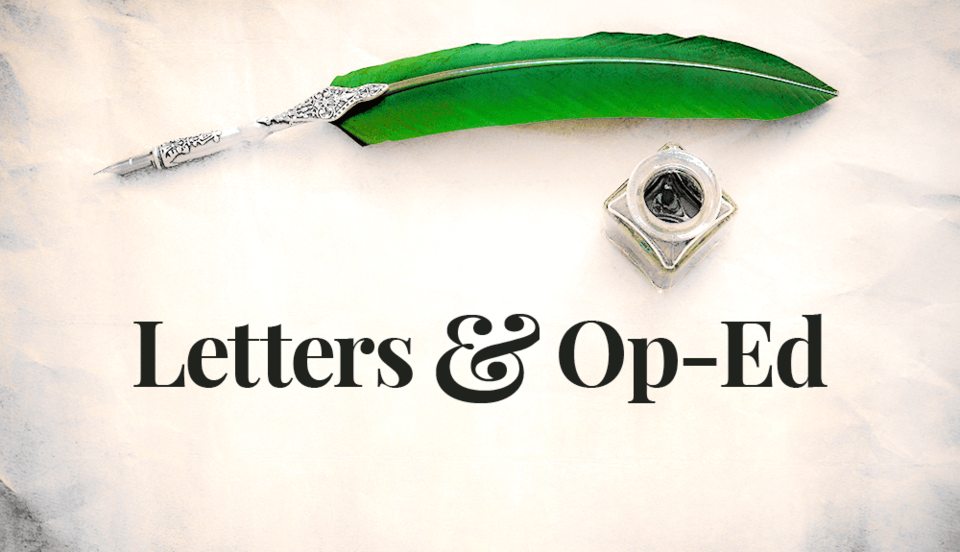Doesn’t failing to show up usually get you fired?
In the days when my dad was a councillor in Pickering, and then Chair of the Durham Board of Education, the paycheque was an honorarium. Not one person found the paltry excuses this Gang of Four finds when they don’t feel like doing their job or going to meetings and voting on matters of importance to the town.
I wonder if the folks who work for some of these councillors would still have their jobs if they behaved the way the Gang does. The lack of integrity among all of the Gang of Four leaves a bitter taste, but the fact that they get paid for their insolence to the town is reprehensible. I hope the door slams them all in the rear-end when they leave the building. Hopefully the young people in our town will not follow in their particular footsteps.
J. Vlym Fonthill
Science is self-correcting, religion is stuck in dogma
Letter-writer Janet Gritter thinks that I have “faith” in scientific experts to provide the truth [“Scientists still have souls,” Letters, Sept. 7, p.8]. But science is self-correcting, as opposed to religious faith which is immutable.

An example of the self-correction of science is the cold fusion kerfuffle of 1989. Scientists Pons and Fleischmann announced that they had discovered cold fusion. Instead of producing electricity in massive fusion reactors at temperatures in the millions of degrees, they had done so in a lab beaker at room temperature. The mainstream media announced that the world’s energy crisis was solved and that electricity would be so cheap, it would no longer be metered. My response was “Let’s wait and see.”
Subsequent experiments by them and by other scientists showed that their original claim was invalid, and they both left the U.S. to work in France and subsequent funding for their experiments dried up.
If ever scientific evidence is presented that refutes the overwhelming proof of evolution, it will disappear. But it won’t do so because an individual presents biblical texts as “evidence.”
David Fowler Wainfleet
Getting the facts right matters
In the September 7 edition of the Voice, letter-writer Janet Gritter refers to Francis Collins, a renowned geneticist who was a leader in the human genome project that sequenced the human genome. She refers to him as a Christian scientist and a Nobel laureate.
False. Francis Collins is not a Nobel laureate. Janet Gritter is confusing Collins with Steven Weinberg.
“In 2008 Collins and Stephen Weinberg, a Nobel prize recipient for physics, shared the Trotter Prize awarded at Texas A&M University, which seeks to reveal connections between science and religion.” That’s from Wikipedia.
Nobel laureate Steven Weinberg, 1933 to 2021, was an atheist. That’s also from Wikipedia.
Referring to Collins in her concluding sentence, Janet Gritter claims incorrectly, “this Christian scientist was a Nobel laureate. Internet searching reveals many.”
Facts matter. False claims and undocumented assertions just served to obscure the truth.
Alan Bown Fonthill
Editor’s Note: And with this we bring to an end this latest round of debate about something that needs no debating—the clear and irrefutable evidence that evolution is real and the earth is not just 6000 years old.
Questions, so many questions
What platforms do the Pelham candidates have? What do they want to achieve for Pelham taxpayers? How do they propose to accomplish their goals to benefit Pelham taxpayers? Do they have a longterm vision for Pelham? What separates one candidate from another? Will there be any public meetings to meet and discuss taxpayers concerns?
L. Morgan Fonthill
Editor’s note: Starting this week, the Voice will present interviews with all candidates who agree to do so. The first interview is here.
Oh, he stops all right
In response to Jim Yungblut’s letter in the Voice [“'The California stop,’ two-wheel style,” Letters, Sept. 7, p.4], I would like to say that I share his concerns about cyclists failing to stop at stop signs and the many other violation of our HTA’s rules of the road.
However, I am compelled to respond to his suggestions about John Swart’s compliance.
A few years ago I participated in a Slow Ride through rural Pelham, and all participants were careful at intersections. No car driver would have cause to complain.
A few weeks ago I was leaving a business at Effingham and Canboro, and I have to agree that most cyclists seem to interpret the stop sign there as an advanced green light. I saw a bicyclist approach the intersection and watched for a moment, fully expecting him to blow through it. He did not. There were no other vehicles near the intersection, but he still stopped before proceeding and turning onto Canboro.
It turned out to be John Swart. I hope that answers Jim’s question about whether or not John stops at stop signs.
Dave Smith Fenwick
Being Frank about it
This is a letter to echo the sentiment of another Voice reader where he called out Mr. Frank Adamson’s childish behaviour of parking directly in front of Mayor Junkin’s campaign office with a campaign sign on his car [“Adamson’s behaviour disappoints,” Letters, Sept. 7, p.10].
Frankly, I feel that parking your car in this location is a sign of a much deeper problem here, which is your inability to confront the real issues at hand that we as voters in Pelham would like addressed.
To my mind, a leader should respond and deal with issues head-on and not engage in dirty tactics which only serve to distract from finding solutions to the problems at hand. Mayor Junkin is clear on his vision for the Town of Pelham and as a resident I am grateful that he does not let petty political antics get in the way of executing his community goals.
It will be interesting to see if Mr. Adamson is up for the challenge of disclosing his political platform and what he stands for, or will he continue to engage in unproductive activities that draw attention to him for all the wrong reasons.
Cheryl Leeson Fonthill
Editor’s note: Candidate Adamson lays out his campaign platform in an extensive interview in this week’s edition. As for the parking issue, please see the top of Publisher’s Corner.
COTE'S COMMENTS | Larry Coté
An ounce of R-E-S-P-E-C-T
Perhaps Rodney Dangerfield best introduced this topic with his line “I don’t get no respect.” Sadly, one of the things seeming to be in short supply in our society today is respect. What has caused the decline in the notion “Love thy neighbour?”
The decline in the application of this crucial human construct ultimately leads to a lack of respect for one another, and sometimes even worse calamities.
The recent attack on the very seat of democracy in Washington, DC, might well be symptomatic of this decline. That calamitous activity was not the legitimate workings of a democracy but clearly disrespected every notion of that political system.
The recent incident involving our Deputy Prime Minister, Chrysta Freeland, in which she was profanely assaulted is another unfortunate example of incidents where public disrespect rears its ugly head.
Lamentably, there are many instances and examples of disrespect from which to choose. From the international arena all the way to the municipal level, the disunity and open dislike for colleagues is as palpable as it is sad.
When such divisive behaviors creep into operations at the local level, it is disconcerting and discomforting to local residents. Such disunity is seen to impede progress and delay progress too close to home.
All too often, legitimate debate gives way to personal attacks. Such desensitization is the direct result of losing respect for others of a different opinion, gender, race, citizenship, or other characteristic.
It can be a slippery slope when legitimate debate turns into personally disrespecting others of a different notion.
Frequently on the nightly newscasts, one can observe proponents of one political persuasion personally attack counterparts of another sentiment. Ideally, differences should be resolved through legitimate debate and compromise and not by slandering an opponent’s politics, policies, proclivities, or personality.
Such unbecoming practices, particularly in the realm of politics, could result in increasing level of disrespect for politicians. Such open demonstrations of disrespect may well serve to lead others to adopt such malevolent tactics.
As a result of the perceived decline in respect, many governments and other organizations have resorted to adopting written codes of conduct to codify what at one time were unwritten, but clearly understood, appropriate behaviours. Many organizations now employ an ombudsman to referee behaviors in the workplace to discourage inappropriateness.
Lamentably, disrespect could become a viral-like contagion, and when practiced without regard to its perils coulc lead to mischievous behaviors of pandemic-like proportions.
Hopefully, our younger set will learn that respect for others is a human value that requires careful practice and leads to a more meaningful and peaceful life. One would hope that those in leadership roles will make efforts to avoid disrespecting one another and work toward a more unified and civil atmosphere.
Perhaps someday one might see more wooing than wounding in the chambers of politics and other venues where disrespect is present. Wishful thinking or an improbable prospect? One will have to wait and see.
THE NEXT | Catherine Brazeau
Remember the campfires
Back when summers were long and lazy and I was too young to work a part-time job, there was a clearing in the woods beside my public school. It was both a hangout place and a meetup place. On those days when boredom set in and I was looking for someone to hang with, “Meet me at the clearing” was a silent rallying call. I’d make my way through the well-worn path to an open area in the woods and always find a friend or two — often a group — waiting there with a portable radio and a smoke, sitting on a log around a makeshift campfire. (Yep, fires were happening. Smoking, and sometimes more than that, was happening. Kids were free-range back then. Nobody was checking up or checking in.) We were your typical middle-schoolers: disobedient, pushing against boundaries, embracing our independence.
There we were, among the smoky smoke and woodsy woods, huddled around a fire, telling stories, engaging in a little mischief, finding our voices among the adolescent pain of crushes, body image, and low self-esteem. Those campfires not only held the stories of our teenage angst, they were the connective tissue that held us together. It was the ‘70s version of your social network.

Now that we’re all grown up and incarcerated by the things of life, we seldom roam unsurveilled or huddle around campfires any more to be with each other and tell stories — we sit in front of a screen and scribble (burning) thoughts. Yes, we’re all just a little burnt out and have gotten a bit cranky these past few years. “Meet me at the clearing” has been replaced with wading in the weeds. Oh, there’s heat all right. But not much light, not much warmth, and certainly no nuance.
Looking back, I see these makeshift campfires of my youth as powerful drivers of story and connection. Not so much about what was said as it was about the space between the telling and the hearing, that space where we first learned to feel one another. Maybe because unlike our networked selves, full of fragments and glimpses, our campfire selves invite us to live among others for a little bit in all their manifestations and glory.
These days I purposely look for campfire-like spaces and places where I can share stories, hear stories, and be with people. Because there’s a story humming underneath everyone — even if you don’t know it. And those stories are often the ones that free us, heal us, connect us, and move us in all the ways a screen can’t. Those stories invite us to change, or maybe just change our minds. We eventually come to realize that some of the things we believe about ourselves and others are in fact just fiction.
Now that cooler temps are coming, I suppose we’ll all retreat into the perceived safety of our internet selves, caught among those flaming threads, fake reels, and curated visions of excellence. Let’s get out of the weeds and into the woods again! Where everyone is living a life as vivid and complex as your own. Back to that unstructured timelessness of youth, where we lived more freely, more courageously, more presently. The one that still whispers, “Meet me”… around a table, over a cuppa, for a walk in the hood… so we can tell some stories before they all turn to ashes. Because someone’s waiting for you. And they need a story more than anything else.
Until The Next.



